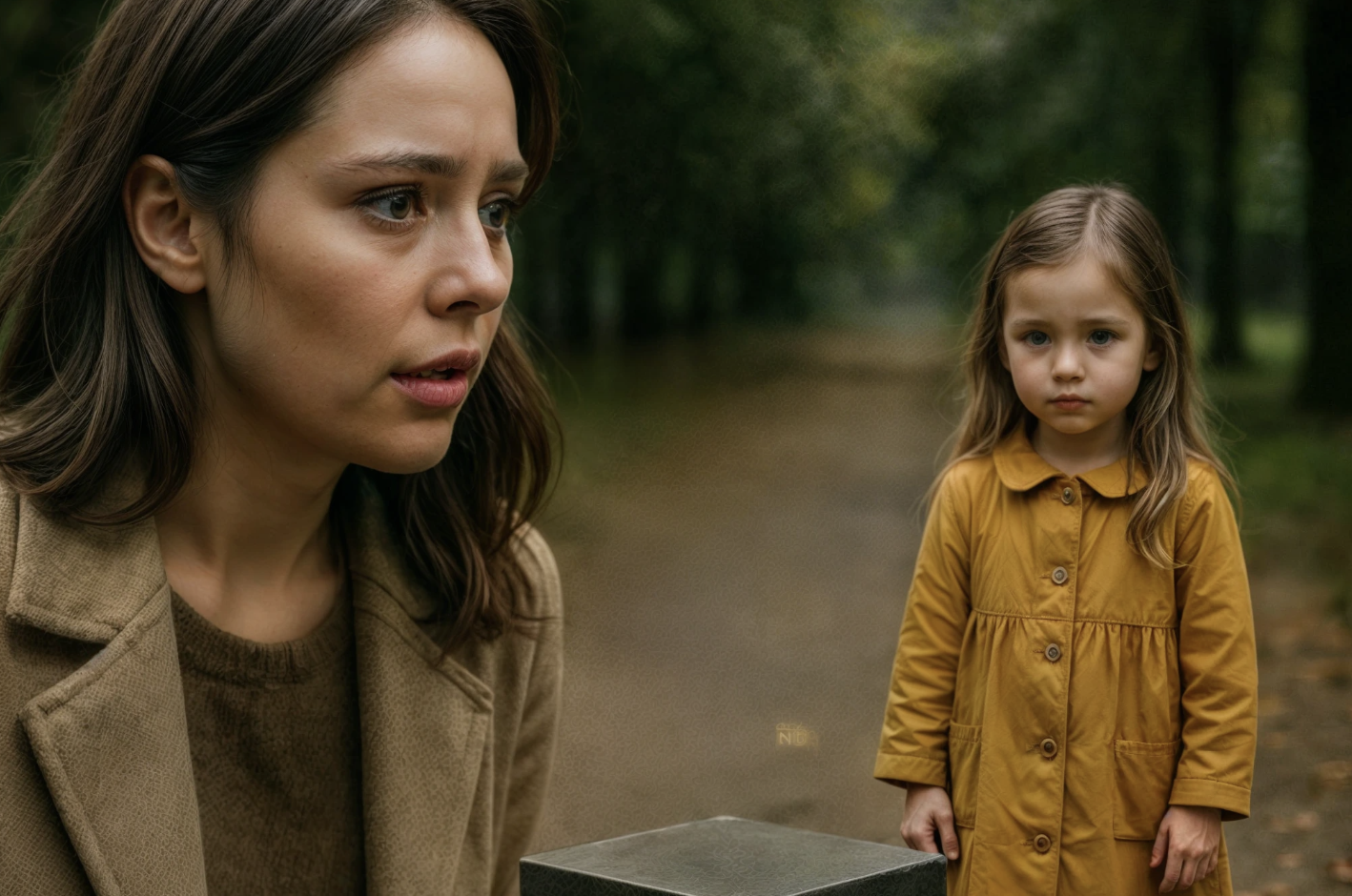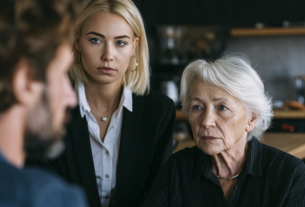Kira worked as an interior designer in a small but successful studio, and weekends were sacred to her.
Today she had planned to meet Vera, who had come from Perm for a few days on business.
Her friend had promised to bring gingerbread from Perm and tell her about a new project to restore an old mansion.
Gorky Park was crowded; somewhere music was playing, children were riding scooters along the wide paths, and young mothers were strolling with strollers.
Kira was walking toward the main fountain, where she and Vera had agreed to meet, already imagining how their long-awaited get-together would go.
But all her plans fell apart when she saw her sister-in-law’s eleven-year-old daughter.
Natasha was standing next to a cardboard box on which cups, saucers, and small teapots were laid out.
The girl looked lost amid the bustle of the park, as if she had landed in a foreign world. Kira could not believe her eyes. What was her niece doing here alone?
“Natasha!” she called as she came closer. “Hi!”
The girl lifted her head, but instead of the happy smile Kira expected, Natasha’s face twisted, and she burst into tears.
She threw herself into her aunt’s arms, pressing her thin little body to her with all her strength.
“Aunt Kira,” she sobbed, “I’m so glad you’re here! I’m so happy to see you!”
Kira hugged her niece.
“Natasha, what happened? Calm down and tell me. Why are you here alone? Where is your mom?”
The girl only clung to her tighter, and through her sobs came:
“Aunt Kira, can you feed me? Please! I haven’t eaten anything today, and I’m so hungry.”
Kira looked at the child’s tear-streaked face and could not understand what was happening in her sister-in-law’s family.
They hadn’t spoken in three years. Back then, Lyuda had asked to borrow a large sum of money, swearing she would return it in a month.
But a month passed, then a second, a third. Lyuda seemed to vanish — she didn’t answer calls or messages.
Kira even went to her mother-in-law’s to find out what was going on with her daughter, but the older woman just waved it off and said that Lyuda had been irresponsible since childhood.
Her mother-in-law was a very particular kind of woman. After the divorce, when the children were ten, she started bringing new men home often and would send the kids out to play on the street until late in the evening.
She said it was good for them to get some fresh air. In reality, she just didn’t want them getting in the way of her dates.
Kira recalled these family stories and realized that all this time Natasha had been growing up in a troubled environment. But to let things get this bad — even she couldn’t have imagined.
“Natasha, tell me what’s going on. Why are you here selling these things by yourself?”
“Mom said I have to sell them,” the girl answered quietly. “Otherwise we won’t have any money at all.”
“And where is your mom? Why didn’t she come with you?”
Natasha hesitated, clearly not knowing how to explain.
“She stayed at home. She says she’s feeling sick.”
Kira took Natasha by the hand and started to lead her away, but the girl suddenly tore her hand free and cried out:
“No, Aunt Kira! We can’t leave the stuff here! Mom will be really angry if I don’t sell everything. She says I’m useless and good for nothing!”
Kira froze. Was Lyuda really forcing an eleven-year-old child to sell things out on the street?
“All right,” she said calmly. “Let’s pack everything up carefully and take it with us.”
Natasha gave a sigh of relief and hurriedly began putting the dishes back into the box. She wrapped each cup carefully in old newspaper, as if they were precious items and not just ordinary crockery.
“Now we can go,” she announced, lifting the box. “Mom says if something gets lost, it’ll be a disaster.”
They walked to a small café with an outdoor terrace where they served snacks and drinks. At the nearby tables, couples sat eating ice cream, a group of students was discussing a movie, and an elderly man was drinking coffee and reading a newspaper.
“Two shawarmas, please,” Kira asked the server. “And lemonade for the girl.”
“Of course! It’ll be ready in five minutes,” the young man behind the counter said with a smile.
Natasha settled at a table, set the box beside her, and laid her hand on it.
She was afraid someone might grab the things. But when a plate with hot shawarma appeared in front of her, she forgot about the box instantly.
The girl fell on the food with such hunger it seemed she hadn’t eaten in days. She took big, hurried bites; sauce smeared across her chin.
Kira waited until Natasha finished eating and didn’t ask unnecessary questions.
The girl ate with total focus, as if she were afraid someone might take the plate away.
Only when the shawarma was gone and the lemonade drained did Kira gently speak:
“Natasha, what were you doing in the park with those things? And why doesn’t your mom feed you at home?”
Natasha frowned and fell silent. For several minutes she sat there, clearly deciding whether she should tell the truth. Then she said quietly:
“Mom says I have to stand there and sell the cups. And give her the money.”
“But why you? Where is your mom?”
“She stays home. She says she’ll get sick and needs money for… for…” the girl stumbled, “for treatment.”
Kira remembered that three years ago Lyuda had been working as a secretary at some firm and earning a decent salary. Had she really lost her job?
“And do you go to school?” Kira asked.
“No.”
“Why not?”
“Mom said I have to help her earn money, and they don’t teach that at school.”
“How long have you not been studying?”
“I don’t know… A long time. Maybe a year, maybe more.”
Kira felt a chill in her chest. So the girl had been out of school for over a year, selling things on the streets and going hungry. What was happening in that family?
“Natasha, what does your mom do at home while you’re out working here?”
“I don’t know. When I come back, she’s usually asleep. And sometimes Uncle Vitia is there. He sleeps a lot too.”
Kira moved closer to Natasha, put an arm around her, and said softly:
“We’re going to my place now, to Uncle Seryozha. All right?”
Natasha immediately grew anxious and tried to pull away:
“No, I can’t! Mom will be really mad if I don’t sell all the stuff! She yells at me when I bring home little money and says I’m lazy and stupid!”
“How much money do you usually bring home?”
“It depends. Sometimes two hundred rubles, and sometimes nothing at all. People don’t really want to buy the cups.”
“And what does your mom say then?”
“She…” Natasha faltered and lowered her eyes. “She says I’m useless and that it would’ve been better if she’d never had me at all.”
Kira clenched her fists. How could anyone humiliate their own child like that?
“Natasha, listen to me — no one is going to scold you anymore. I promise. At our place you’ll be fed, you’ll get a bath, and you can play with Olya. Remember your cousin?”
“I remember,” Natasha nodded uncertainly. “But won’t Mom look for me?”
“Don’t worry about that. I’ll talk to your mom myself.”
Something in Kira’s voice calmed the girl. She nodded and obediently followed her aunt toward the park exit, even forgetting about the box of dishes.
On the way, Kira remembered about Vera and took out her phone. Her friend picked up right away:
“Kirочка, hi! I’m stuck at my husband’s relatives’. They’ve thrown some family celebration, and they won’t let me go. I think I’ll be at least two hours late.”
“You know what, Vera,” Kira said quickly, “something urgent came up for me too. Let’s just meet in the evening instead. Come over to my place, we’ll have dinner and chat over a glass of wine.”
“Oh, that’s even better!”
They reached the car; Kira opened the back door and Natasha climbed inside with curiosity. It was obvious she hadn’t ridden in a car for a long time — she inspected the interior with interest and touched the soft upholstery of the seats.
“Aunt Kira, your car is so pretty!” she said admiringly. “Can we put some music on?”
“Of course we can.”
On the way home, Kira decided she would first take Natasha to their place, and then go to Lyuda to find out what was really going on.
When Sergey saw his niece, he was stunned — they hadn’t seen her for so many years, and here she was, out of the blue.
“Natashka!” he exclaimed. “No way! Look how you’ve grown!”
The girl gave a shy smile and ran up to her uncle. Sergey swept her up in his arms and spun her around, and Natasha let out a ringing laugh — maybe for the first time in a long while.
“Uncle Seryozha, I remember you!” she said. “You gave me candy for my birthday!”
“Of course I did! And I’ll give you lots more.”
Kira bent down to the girl and quietly asked:
“Natasha, whisper to me where you and Mom live now. What’s your address?”
The girl whispered the address just as quietly and gave a sly little smile, taking it as a kind of game with her aunt.
“Seryozha,” Kira said to her husband, “I’ll explain everything later. For now, make sure Natasha takes a bath and changes. Give her something from Olya’s things.”
“Where’s Olya?” Natasha asked.
“She’s at Grandma’s,” Sergey explained. “But she’ll be back soon, and you two can play.”
He nodded, understanding from his wife’s expression that something serious had happened and that questions were better left for later.
“Don’t worry,” he said. “We’re going to have a great time here, right, Natasha?”
Kira went back down to the car, got behind the wheel, and drove to the address the girl had given her.
She needed to see with her own eyes what kind of conditions the child was living in and understand what was going on with her sister-in-law.
She pulled up to an old nine-story building that had clearly been built back in Soviet times and hadn’t been repaired since.
In the courtyard, the asphalt was cracked, with grass pushing up through the gaps.
Kira climbed to the third floor and found the right apartment. The number on the door was written in faded digits, and where the doorbell should have been there were bare wires sticking out.
She raised her hand to knock but noticed the door was slightly ajar.
Kira slowly pushed it open and stepped inside.
The first thing she noticed was the smell. A mix of stale air, old cigarette smoke, and something sour. Kira immediately pinched her nose.
Clothes were scattered all over the hallway, dirty plates stood on the floor, and in the corner there was a pile of boxes and bags.
A female voice drifted from the kitchen. Kira walked in that direction and saw a scene that explained everything.
Lyuda was sitting at the kitchen table with a puffy, bloated face and disheveled hair.
Her old housecoat was stained with spots; her eyes were red and glassy. Next to her at the table sat an unfamiliar middle-aged man in a wrinkled shirt, nodding off and mumbling something under his breath from time to time.
On the table stood an opened bottle of vodka, several dirty shot glasses, and a plastic one-and-a-half-liter bottle of water.
Lyuda seemed not to notice that someone had entered the apartment. She picked up a shot glass, with difficulty brought it to her mouth, tossed back the contents, and chased it with water from the bottle.
Then she muttered something and reached for the vodka again.
“Uh… who’s that?” the man drawled, forcing his head up and trying to focus his gaze on Kira.
Lyuda didn’t even turn around. Kira realized there was no point trying to talk to her sister-in-law in such a state. And there was nothing to talk about — everything was clear enough.
She turned silently and left the apartment, closing the door firmly behind her.
Now she knew exactly what was going on in Natasha’s life and was determined to change it.
The girl deserved a different kind of childhood, not begging and hawking things in parks, living in fear of her own mother.
At home Kira walked in on an unusual scene. Sergey was on all fours in the middle of the living room, pretending to be an elephant, while a freshly washed Natasha in one of Olya’s dresses sat proudly on his back.
The girl clung to his shoulders and laughed happily as her uncle trumpeted and stomped around the room, swaying carefully.
“Uncle Seryozha, now let’s play zoo!” Natasha begged. “You’ll be a giraffe, and I’ll be the zookeeper!”
“Okay, but first the giraffe needs a drink of water,” Sergey laughed. “I’m tired of being an elephant.”
Kira stood in the doorway and watched the scene with tenderness.
Natasha looked like a completely different child — clean, in a pretty dress, her eyes shining, her cheeks rosy.
As if in just a few hours not only the dirt had been washed off her, but also the heavy weight of fear and worry.
“Aunt Kira!” the girl exclaimed happily when she noticed her. “We’re playing zoo! Uncle Seryozha is such a funny elephant!”
“I can see that,” Kira smiled. “And have you eaten?”
“Yes! Uncle Seryozha made dumplings with sour cream for me, and then we had tea with cookies. And he showed me pictures of Olya!”
Sergey got up from the floor, brushed off his knees, and walked over to his wife.
“So, everything all right?” he asked quietly.
Kira shook her head and gave a meaningful look toward Natasha. Her husband understood without another word.
“Natasha,” he said to the girl, “how about we watch some cartoons?”
“Yay!” Natasha cried and ran to the TV.
When the girl had settled on the couch with the remote in her hand, Kira and Sergey went into the kitchen.
“Is it bad?” her husband asked softly.
“As bad as it gets. Lyuda’s become an alcoholic, the child is starving, not going to school, selling junk in the park.”
“And what are we going to do?”
“Tomorrow I’m going straight to child protective services,” Kira replied. “I’ll start the paperwork for temporary guardianship, and then I’ll push to have Lyuda’s parental rights revoked.”
Sergey nodded.
“Good. Natasha will be better off here.”
From the living room came the sound of happy, carefree laughter.
Kira thought that before they had one daughter, and now they would have two. And that was wonderful.
Natasha deserved a real childhood full of joy and care, not fear and deprivation



